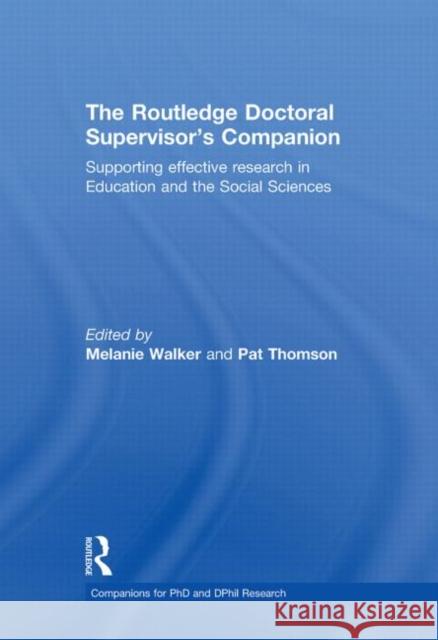The Routledge Doctoral Supervisor's Companion : Supporting Effective Research in Education and the Social Sciences » książka
The Routledge Doctoral Supervisor's Companion : Supporting Effective Research in Education and the Social Sciences
ISBN-13: 9780415484138 / Angielski / Twarda / 2010 / 300 str.
The Routledge Doctoral Supervisor's Companion : Supporting Effective Research in Education and the Social Sciences
ISBN-13: 9780415484138 / Angielski / Twarda / 2010 / 300 str.
(netto: 699,68 VAT: 5%)
Najniższa cena z 30 dni: 705,23
ok. 22 dni roboczych.
Darmowa dostawa!
This book places at its centre the interwoven questions of what it means to be a doctoral student in the social sciences, what is involved in becoming and being a researcher and clearly shows how the role of the supervisor is key to the studentâs personal development.
This book accompanies the Routledge Doctoral Student's Companion. It is not yet another book on competing teaching paradigms, nor a guide to how to hand-hold students to do a piece of doctoral work from beginning to end, nor a view of the doctorate which comprises âtips and tricksâ, nor approaches to âwriting upâ a thesis, or set of researcher biographies. Rather The Routledge Doctoral Supervisorâs Companion places at its centre the interwoven questions of what it means to be a doctoral student in the social sciences, what is involved in becoming and being a researcher and clearly shows how the role of the supervisor is key to the studentâs personal development. It further details what research capabilities are key to confidence, quality and success.
In each chapter, having provided a framing for the question under discussion, given some history of the debates, and offered a helpful lexicon through which to understand the topic, The Doctoral Supervisor's Companion provides information about helpful resources and methodological and method support. In this way, it acts as a road map to the international literatures and best practice. This, together with the diverse range of writers in the book, will ensure an international readership for the text.
This book will be a vital tool both for beginning and established supervisors and has the potential to be a key text for all education and cognate disciplines. It is not focused on methods and methodologies (other texts do that amply well) but addresses the sorts of questions that need to be taken up by developing researchers, debated and argued, as well as providing pragmatic and practical thinking about how to aid studentsâ research/scholarly careers and identities. Nor is this a simple question and answer text. The questions and issues raised are fundamental to the doctorate and ones which the academic audience finds itself discussing repeatedly. While there is no one solution to ideal supervision, this wide-ranging text offers proven solutions that will help supervisors develop their own personal style of effective supervision.
Ideal for all supervisors whether assisting the increasing number of part time doctoral researchers who have less access to supervision and campus based courses and resources or assisting traditional full-time students, it is also highly suitable for helping academics to support international students who must adapt to Western doctoral traditions: this text will help both supervisor and student to understand why things are as they are.











